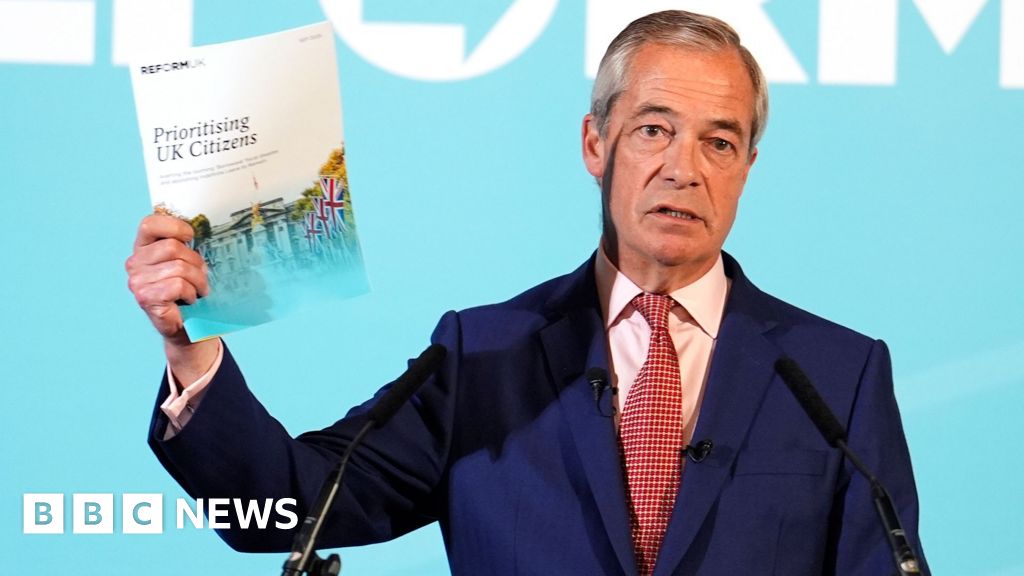Reform UK has announced it would abolish the right of migrants to qualify for permanent settlement in the UK after five years, if the party wins the next election.
Under the plans, migrants would need to reapply for new visas with tougher rules, and abolish Indefinite Leave to Remain (ILR), which gives migrants rights and access to benefits.
Reform has also said it plans to bar anyone other than British citizens from accessing welfare. The party claims their plans would save £234bn over several decades.
Chancellor Rachel Reeves said the suggested savings “have no basis in reality” and the government were already looking at restricting migrants’ welfare access.
Reform UK Leader Nigel Farage said the UK should not be “the world’s food bank”.
Launching the new policies Farage said: “It is not for us to provide welfare for people coming in from all over the world.”
Under the current system, migrants can apply for indefinite leave to remain after five years, giving the right to live, study and work in the UK permanently.
It is a key route to gaining British citizenship and allows people to claim benefits.
Reform said it would replace ILR with visas that force migrants to reapply every five years. That includes hundreds of thousands of migrants currently in the UK.
Applicants would also have to meet certain criteria, including a higher salary threshold and standard of English.
The government is currently consulting on plans to double the average wait for migrants to apply for ILR from five years to 10.
The announcement launches Reform’s fresh assault on what they brand the “Boriswave” – 3.8 million people who entered the UK after Brexit under looser rules brought in by Boris Johnson’s administration.
Speaking at a press conference, Farage said the “main reason” for the policy was to “wake everybody up to the Boris wave”.
Hundreds of thousands of these migrants, who have come to the UK since 2021, will soon qualify for permanent residence under the ILR scheme.
Reform said the changes would not apply to EU nationals whose settled status is protected under the European Union Withdrawal Agreement – and who make up the majority of benefit claimants by people with ILR.
But EU nationals not benefiting from the provisions of the Withdrawal Agreement will be subject to the new system.
According to a report published on Monday, Reform said it would replace IRL with an increase in the number of entrepreneur and investor routes for migration “supporting founders, innovators, and those willing to commit significant capital to our economy”.
Reform will also introduce a new scheme called Acute Skills Shortage Visas (ASSV) for jobs in crisis. Under the scheme, firms can hire one worker from abroad only if they train one at home.
Reform will also raise the average wait for UK citizenship from six years to seven.
It is usually possible for someone to apply for ILR if they have worked in the UK for five years, although it can be two or three years if they came to UK on particular visas.
Applicants must usually meet English language requirements, have no serious criminal record and may have to pass the Life in the UK test.
A person can currently apply for British citizenship 12 months after they have been granted indefinite leave to remain.
Reform policy chief Zia Yusuf argued the changes would lead to “hundreds of thousands of people having to apply and ultimately losing their settled status in the UK”.
“Many of those who will lose their leave to remain are entirely dependent on the welfare state and will leave voluntarily upon losing access to benefits,” he said.
“Those that don’t will be subject to immigration enforcement as part of our mass deportation programme.”
Reform say their policy is designed to bring Britain into line with other countries such as the US and United Arab Emirates (UAE) and save the UK more than £234bn over what it calls the “lifetime of the average migrant”.
Labour has noted the figure came from a report by the Centre for Policy Studies, a Thatcher-founded think tank, which later said the cost estimates “should no longer be used” after a challenge by the Office for Budget Responsibility.
But Farage said the “exact figure” was not known due to gaps in publicly available data but argued the £234bn figure “is without doubt too low”.
The Chancellor said: “The numbers that Reform have come out with overnight have already begun to disassemble.
“I want to bring down illegal migration. This government is bringing down migration.
“We have sent a record number of people who have no right to be in our country home. We’re reducing the use of hotels for asylum seekers and we’ve made an agreement with France to send people back who come over on small boats.
“Those are all steps towards our ambitions to get a grip of this situation that we inherited.”
Conservative shadow housing secretary James Cleverly said Reform were “catching up” with his party’s plans to ban migrants from settling indefinitely in the UK if they claim benefits.
Speaking on BBC Two’s Politics Live programme, Cleverly said he was “far from convinced that the savings are where Nigel Farage said they’re going to be”.
The Liberal Democrats said Reforms proposals were “not serious”.
“Businesses would be thrown into disarray, and the UK would lose billions in economic growth and tax revenues,” a Lib Dem spokesman said.

